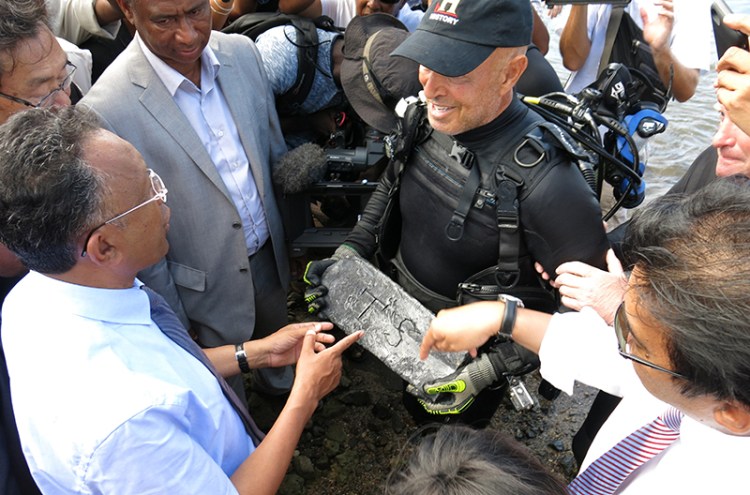SAINTE MARIE ISLAND, Madagascar — Divers in Madagascar have found a silver bar weighing about 50 kilograms (110 pounds) that they believe was part of the treasure of pirate Captain Kidd.
The bar was presented to Madagascar’s president, Hery Rajaonarimampianina, in a ceremony Thursday on the island of Sainte Marie, near the country’s northeast coast. The bar was found in a bay off the island, the diving team said.
The team was led by Barry Clifford, an American undersea explorer who has been searching for pirate treasure for many decades. Clifford believes there could be more treasure on the bay floor where he found the bar, among debris that he believes belongs to one of Kidd’s boats. Clifford is a 1965 graduate of Maine Central Institute.
“There’s more down there,” Clifford said. “I know the whole bottom of the cavity where I found the silver bar is filled with metal. It’s too murky down there to see what metal, but my metal detector tells me there is metal on all sides.”
The bar is around 40 centimeters (16 inches) long and has two clearly visible markings engraved on one side. The team believes it was manufactured at the end of the 17th century in Bolivia.
John de Bry, an underwater archaeologist called in as a consultant by the diving team, said after seeing the silver bar that he, too, believed it was connected to Captain Kidd but more research was needed to prove it.
William Kidd, known as Captain Kidd, raided ships at the end of the 17th century before being captured and executed in London in 1701.
Sainte Marie island was a hideout for pirates when Captain Kidd was active. The island offered safe harbours and was close to maritime trading routes.
Madagascar’s president said he hoped that the discovery of the silver will increase Madagascar’s international profile and bring more tourists to the island.
At one point during Clifford’s current exploration, the Madagascar authorities called a halt the work, worried the team was violating archaeological procedures. The culture ministry appealed to UNESCO, the United Nations cultural body, to help them investigate. The work continued after the president’s office intervened.
Send questions/comments to the editors.



Success. Please wait for the page to reload. If the page does not reload within 5 seconds, please refresh the page.
Enter your email and password to access comments.
Hi, to comment on stories you must . This profile is in addition to your subscription and website login.
Already have a commenting profile? .
Invalid username/password.
Please check your email to confirm and complete your registration.
Only subscribers are eligible to post comments. Please subscribe or login first for digital access. Here’s why.
Use the form below to reset your password. When you've submitted your account email, we will send an email with a reset code.